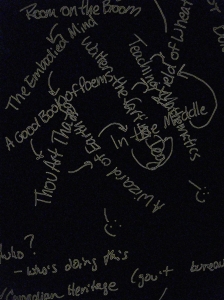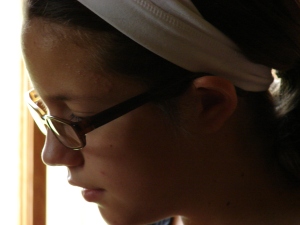A Matter of Perspective
 I always bring a book when I visit my doctor. Unless it’s an emergency, an appointment with my doctor requires a lengthy wait – our partnership is worth it. Last week, well into the second hour of waiting, climbing over the chairs from the row behind me, was a pre-kindergartener; her goal was the entertainment magazine on the table in front of me, or, perhaps, a moment away from her three even-younger siblings. She flipped through the magazine with purpose, and began a conversation with her mother, seated behind me. She wanted to know about John.
I always bring a book when I visit my doctor. Unless it’s an emergency, an appointment with my doctor requires a lengthy wait – our partnership is worth it. Last week, well into the second hour of waiting, climbing over the chairs from the row behind me, was a pre-kindergartener; her goal was the entertainment magazine on the table in front of me, or, perhaps, a moment away from her three even-younger siblings. She flipped through the magazine with purpose, and began a conversation with her mother, seated behind me. She wanted to know about John.
I wondered, John who? Thankfully the mother understood, and that, I suppose is the point. The mother explained softly to the child, “No, John and Kate are not together anymore. Kate and the kids are going to have their own show.” The child’s questions continued and the mother confirmed for the child, “Yes, Honey, no show for John. The lawyer said so.” The child seemed to understand this language of reality television, and processed its context too much greater depth than the regurgitated verbal reruns offered by my daughter after evenings spent with my neighbours’ children.
Yet, there I sat in the poorly padded chair wondering, would this child grow to someday wonder the same of the ‘great authors,’ who? who? Was she diminished by her different way of knowing? A l ittle chill came over me and I held my hard cover book a wee bit tighter. I used to believe there was one answer to this question. Now, however, I know there are so many questions, so many answers, so many perspectives… There are immeasurable ways with which to communicate – the knack is knowing that four-year-old language and 37 year-old language, reality show language and Giller prize winner language, must both be honoured as genuine communication.
ittle chill came over me and I held my hard cover book a wee bit tighter. I used to believe there was one answer to this question. Now, however, I know there are so many questions, so many answers, so many perspectives… There are immeasurable ways with which to communicate – the knack is knowing that four-year-old language and 37 year-old language, reality show language and Giller prize winner language, must both be honoured as genuine communication.
Recently a former student blogged, sharing her favorite literary quotes and that got me thinking about the words that have left their mark with me. Even more recently, a former instructor challenged me to think about how his course, my first foray into the world of digital literacy, has influenced or supported my current teaching and learning. The instructor even provided jumping off points in case the answer wasn’t blazingly obvious.
But it is obvious. It’s a matter of perspective. There’s my how: I’ve broke n a teacher rule, perhaps, but there it is. I read, see, listen, understand the world around me completely differently now that I’ve come to understand that there is another lens with which to teach and learn, another lens with which to communicate. I don’t know if I add a layer or peel a layer, or if it’s simply different, but there are simply many more lenses… maybe this will help:
n a teacher rule, perhaps, but there it is. I read, see, listen, understand the world around me completely differently now that I’ve come to understand that there is another lens with which to teach and learn, another lens with which to communicate. I don’t know if I add a layer or peel a layer, or if it’s simply different, but there are simply many more lenses… maybe this will help:
A former student of mine, a brilliant student who struggled with social relationships found so much happiness if she could be near a computer – that’s it, simply near a computer. What meaning is there in that? And she shared this with me in her journal, her paper and pen journal, what meaning is there now?
The first day back from winter break my daughter, an eager grade seven learner, received a letter in  the mail. Her Student Support Services teacher mailed her a Thank You letter. My daughter had never received a thank-you card from a teacher, had never received mail from a teacher. When my daughter is not playing soccer, or reading, she is writing. She often shows me, with great deliberateness, how her teacher goes through the editing process with her, taking time to double space her work, to use coloured fonts and backgrounds. My daughter held the note in her hands and rubbed each hand-written word with her fingers, saying her teacher’s name over and over.
the mail. Her Student Support Services teacher mailed her a Thank You letter. My daughter had never received a thank-you card from a teacher, had never received mail from a teacher. When my daughter is not playing soccer, or reading, she is writing. She often shows me, with great deliberateness, how her teacher goes through the editing process with her, taking time to double space her work, to use coloured fonts and backgrounds. My daughter held the note in her hands and rubbed each hand-written word with her fingers, saying her teacher’s name over and over.
Two years ago, a friend, sent me a book in which he’d underlined passages. One line had a similar effect on me, “the light lunacy of love in your eyes.” The power of the written word… or is it the power of the connections we have with those with whom we connect with these messages? Do the messages you receive mean the same to you? Don’t get me wrong, I don’t get excited over my water bill. But let me ask you this, all you instant messengers out there, when the little ding sounds on your computer and you’re longing to hear it, is that not an emotional response? Have you ever touched the words on the screen?
As I sat in that waiting room last week, I thought of the passage I had just read. A passage, like many of that author’s passages, words that make me bargain with truth. That passage had made me pause enough that I stopped and listened to the child’s conversation. The child climbed over the chairs and I reread the passage:
The first time Doree had gone to Mrs. Sands’s office, one of the other women there had given her a pamphlet. On the front of it was a gold cross and words made up of gold and purple letters. “When Your Loss Seems Unbearable…” Inside there was a softly coloured picture of Jesus and some finer print Doree did not read.
In her chair in front of the desk, still clutching the pamphlet, Doree began to shake. Mrs. Sands had to pry it out of her hand.
“Did somebody give you this?” Mrs. Sands said.
Doree said, “Her,” and jerked her head at the closed door.
“You don’t want it?”
“When you’re down is when they’ll try to get at you,” Doree said, and then realized this was something her mother had said when some ladies with a similar message came to visit her in the hospital. “They think you’ll fall on your knees and then it will be all right.”
Mrs. Sands sighed.
“Well,” she said, “it’s certainly not that simple.”
“Not even possible,” Doree said.
“Maybe not.”
Is there irony that I was reading this work while a child of no more than four was discussi ng a reality show in great depth? Or is the irony that the truth I find in the work I love best is also found in the work that you love best, that my former grade eight student loves best, even if it’s hugely different. We should all find truth in the language we speak, right?
ng a reality show in great depth? Or is the irony that the truth I find in the work I love best is also found in the work that you love best, that my former grade eight student loves best, even if it’s hugely different. We should all find truth in the language we speak, right?
My former student who blogged about her favorite quotes adores one author. She wrote fan-fiction about this author’s work, she brought books to school for others to read, and wrote lengthy stories about how her life and the lives of the characters were similar – this author’s work pushed my former student to read, and pushed her to blog, and pushed her to think critically. This is her language, her truth. Who’s to say which of us is correct…
I was ninety-nine point nine percent sure I was dreaming.
The reasons I was so certain were that, first, I was standing in a bright shaft of sunlight-the kind of blinding clear sun that never shone on my drizzly new home-town in Forks, Washington – and second, I was looking at my Grandma Marie. Gran had been dead for six years now, so that was solid evidence toward the dream theory.
What makes an author good? Is it literary honors or monetary success? What mak es the words powerful? Is it the writing? Is it the message? Is it how popular the message becomes through the power of media? Is it the relationships I attach to the words that give them meaning? Is an author best when her work leaves you with an emotional reaction?
es the words powerful? Is it the writing? Is it the message? Is it how popular the message becomes through the power of media? Is it the relationships I attach to the words that give them meaning? Is an author best when her work leaves you with an emotional reaction?
When I pause long enough to understand different ways of teaching and learning, and understand the different lenses with which my grade eights or, perhaps, a four-year old in a doctor’s office may make meaning, the world opens up. It’s like going from watching, to mucking about with my hands – I’m (un)learning, and it’s all about perspective.
. . . .
Hasebe-Ludt, Erika and Wanda Hurren. “Backyard Questions Written in Stone and Water: Alchemic Possibilities in the Space of the Heart.” Carl Leggo. Curriculum Intertext. New York: Peter Lang Publishing Inc., 2003. 136. (1)
Meyer, Stephenie Meyer. New Moon. New York: Little Brown and Company, 2006. 3. (3)
Munro, Alice. “Dimensions.” Too Much Happiness. Toronto: McClelland & Stewart Ltd., 2009. 8. (2)
